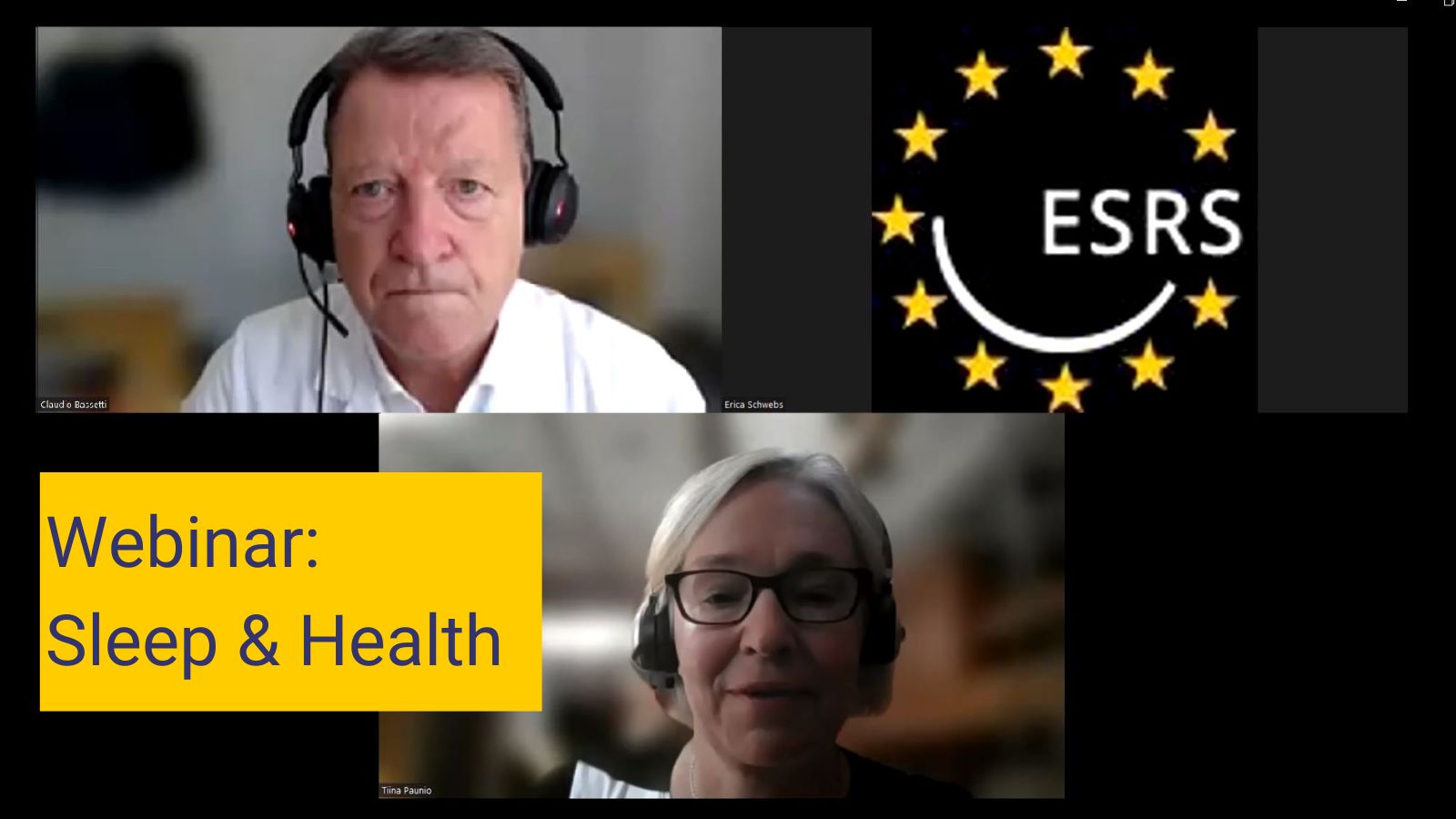Sleep & Health Webinar Report
The ESRS Sleep & Health Webinar took place earlier this week on Tuesday, 12-July 2022. Prof. Dr. Claudio Bassetti not only had the task of moderating the webinar, but he also presented on Sleep and Brain Health and gave a brief overview of Sleep and Health in general. He was joined by Prof. Dr. Tiina Paunio who presented on Sleep and Mental Health and coordinated the active discussion segment.
Sleep & Health
Health, from a medical perspective is the absence of disease or disability, however, this has been expanded by the WHO to encompass physical, mental and social well-being.
While publications on sleep health are relatively new, interest has been steadily growing from a medical, public health and policy-making standpoint. Prof. Bassetti reiterated that it is important to talk about sleep health as there is a significant related burden not only on our overall health, including risk of cancer, obesity, weak immune system, risk of heart disease, increased blood pressure, risk of death, but also on our economy as well (Hafner et al 2017).
In measuring sleep health, different variables should be considered including behaviour, satisfaction, alertness, timing, efficiency and duration (Buysse 2014). Since then, several studies have tried to measure sleep health in determined populations and linking the presence of good or bad sleep to a specific outcome. Prof. Bassetti presented several specific studies supporting this hypothesis including Qui’s multidimensional approach (Fan et al 2020), and sleepiness and mortality (Wan et al 2020).
Sleep should be used to prevent diseases and promote disease modification through sleep intervention across the lifetime. More research is required on this topic as well as education and policy changes.
Sleep & Mental Health
Mental disorders are very common, especially anxiety disorders, insomnia and depression (Wittchen et al. 2011), and sleep disturbances in these is equally prevalent.
In non-affective psychosis (like schizophrenia), sleep disturbances are quite frequent: insomnia, nightmares and hypersomnia (Cederlöf et al 2022). Sleep disturbances can also be found in mood disorders where more than 90% of patients with depression experience insomnia or hypersomnia (Geoffroy et al. 2017).
Sleep deprivation (acute) can lead to the disruption of a variety of psychological processes, but are time dependent and unique to each individual (Waters et al. 2018). Insomnia (chronic) is the most important risk for anxiety and depressive disorders, but also for somatic diseases (Bassetti et al. 2021).
Regarding the co-occurrence of sleep traits and mental disorders, there are examples that show (1) disturbed sleep leads to mental disorders, (2) mental disorders can lead to disturbed sleep and (3) factors can express themselves as disturbed sleep in the night and mental disorders in the day. However, the majority of the data supports the first case.
Prof. Paunio closed her segment by offering several therapeutic considerations, notably, treat the sleep disorder with evidence-based treatment protocol for that disorder. (Currently in psychiatry, the thought is that treating the basic mental disorder the sleep problems will resolve themselves).
Sleep & Brain Health
Brain health is important because of its high/increasing burden of brain disorders, insufficient awareness about neurological disorders and brain health, no dedicated policies/budgets for neurological disorders in most countries, and high stigma/discrimination of patients with neurological disorders. It’s important to note that brain disorders can be prevented, treated and rehabilitated (Bassetti et al. 2022).
And good (normal) sleep is a major contributor to preserving brain health. Sleep-wake circadian disturbances are risk factors for neurological disorders, examples of which include EDS leading to stroke and insomnia leading to Alzheimer Disease (Bassetti et al. 2021).
There have been several interesting studies on sleep loss as it relates to amyloid accumulation. Sleep deprivation can lead to a decrease in the detoxification mechanism related to sleep, leading to the accumulation of toxic proteins and neurodegeneration, as well as an increase in synaptic activity (Noble 2019).
Prof. Bassetti went further to outline several sleep disorders which have a neurological impact, including OSA doubling the risk of stroke (Bassetti et al. 2020), insomnia/sleep loss triggering migraines and seizures and circadian disturbances causing headaches, stoke and seizures (Bassetti et al. 2021).
More resources and research should be dedicated to a sleep-centred approach focused on promotion, prevention, treatment, care and rehabilitation of brain/neurological diseases.
For more details on the presentations, the recording of this webinar is available to ESRS members on-demand. Not yet an ESRS member? Join us today to gain access to this in addition to even more membership benefits.
References
- Nobile (2014). The WHO definition of health: A critical reading. Med Law.
- Hafner et al. (2017). Why Sleep Matters-The Economic Costs of Insufficient Sleep: A Cross-Country Comparative Analysis. Rand Health Q.
- Buysse (2014). Sleep Health: Can We Define It? Does It Matter? Sleep.
- Fan et al. (2020). Sleep patterns, genetic susceptibility, and incident cardiovascular disease: a prospective study of 385 292 UK biobank participants. Eur Heart J.
- Wang et al. (2020). A Multidisciplinary, Community-Based Program to Reduce Unplanned Hospital Admissions. JAMDA.
- Wittchen et al. (2011). The size and burden of mental disorders and other disorders of the brain in Europe. European Neuropsychopharmacology.
- Cederlöf et al. (2022). Sleep in Psychotic Disorders: Results From Nationwide SUPER Finland Study. Schizophrenia Bulletin Open.
- Geoffroy et al. (2018). Insomnia and hypersomnia in major depressive episode: Prevalence, sociodemographic characteristics and psychiatric comorbidity in a population-based study. Journal of Affective Disorders.
- Waters et al. (2018). Severe Sleep Deprivation Causes Hallucinations and a Gradual Progression Toward Psychosis With Increasing Time Awake. Front Psychiatry.
- Bassetti et al. (2021). Sleep Medicine Textbook 2nd Ed. European Sleep Research Society.
- Bassetti et al. (2022). The European Academy of Neurology Brain Health Strategy: One brain, one life, one approach. Eur J Neurol.
ESRS Reminders
ESRS-GEF Childcare Support Grant
This grant aims to provide financial support to parents to cover childcare expenses on-site or at home to enable attendance at the 26th congress of the ESRS, Sleep Europe 2022 in Athens, Greece. If at the time of the congress you have childcare obligations, we encourage you to apply.
Deadline: 9 August 2022
More details here.
Sleep Europe 2022 Late Breaking Abstract Submission
We are currently accepting submissions for late breaking abstracts. These abstracts should contain data or relevant information that was not yet known or available by the normal submission deadline (26 April 2022) for it to be accepted.
Deadline: 16 August 2022
More details here.
Sleep Europe 2022 Regular Registration
The ESRS Board is pleased to announce that regular registration is now open for Sleep Europe 2022 in September in Athens, Greece. We look forward to seeing you there in-person for an exciting programme including new teaching courses, more keynote speakers than ever before and numerous sessions based on our six educational tracks.
Deadline (Regular Registration): 30 August 2022
View the entire scientific programme and register today.
Become More Active in the ESRS
The Sleep Medicine Committee is seeking an effective member to fill the position of Chair for the committee. This is one of our largest and most productive committee’s, with four working groups dedicated to promoting clinical sleep medicine as its own healthcare discipline.
Deadline: 15 August 2022
More details here.
The ESRS Board invites you to submit nominations for members of the 2022 – 20224 ESRS Board and Scientific Committee. This is an excellent way in which you can get more involved in the society and contribute in an even greater way to the sleep science field.
Deadline: 14 September 2022
More details here.





